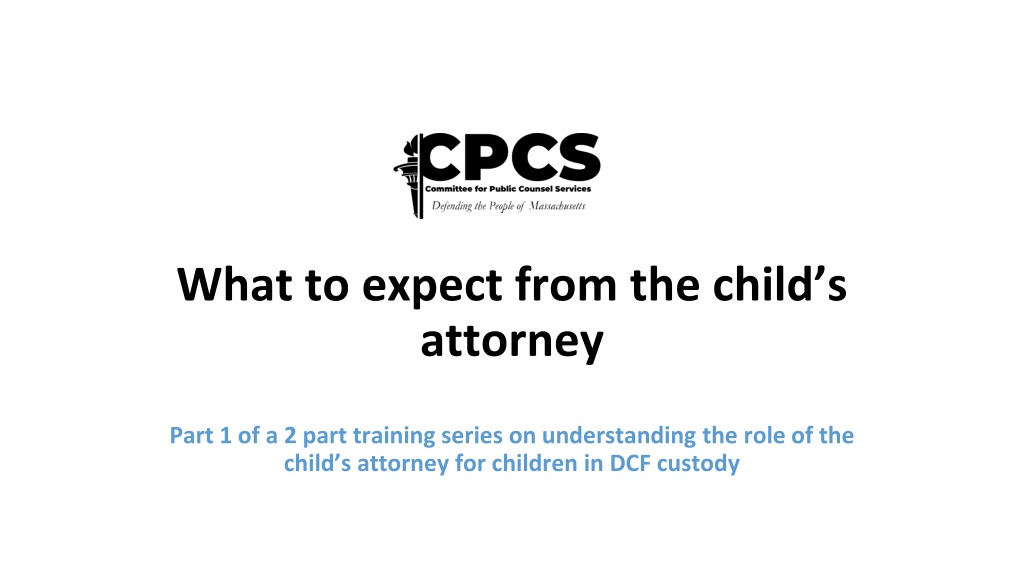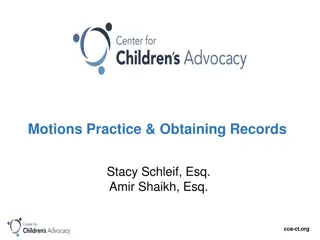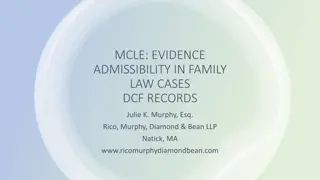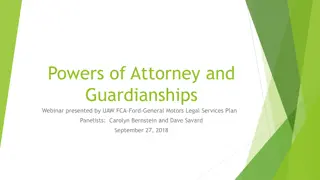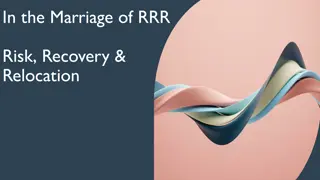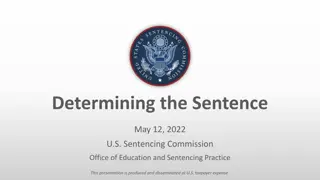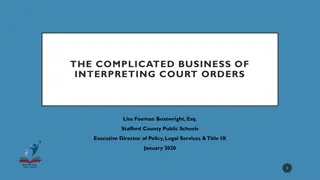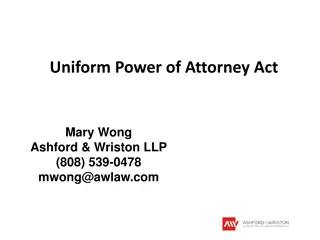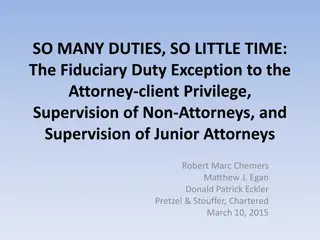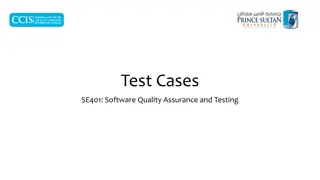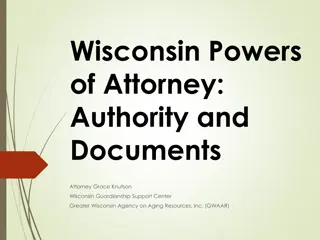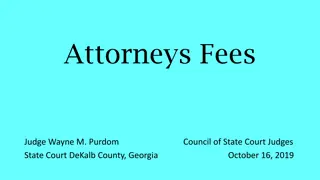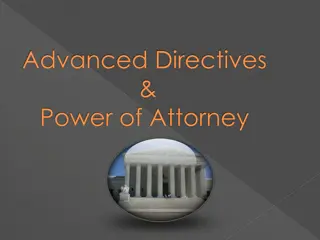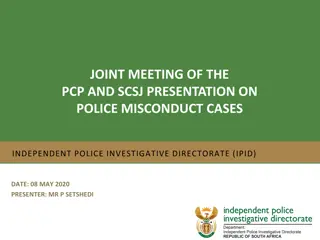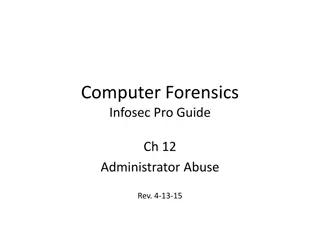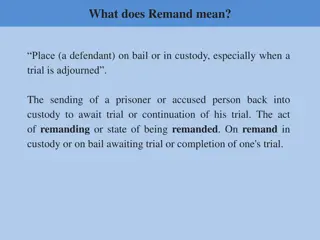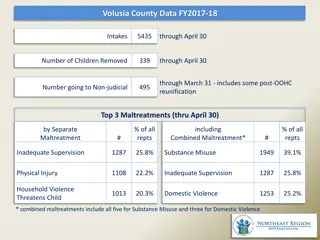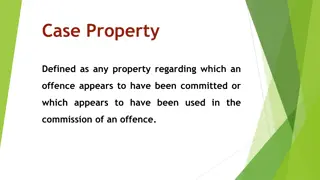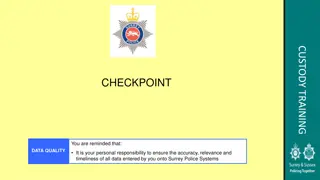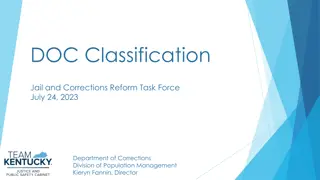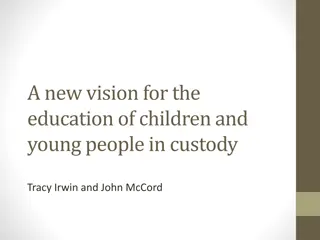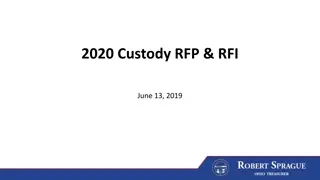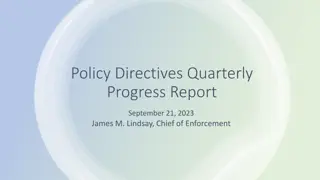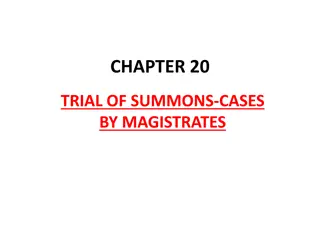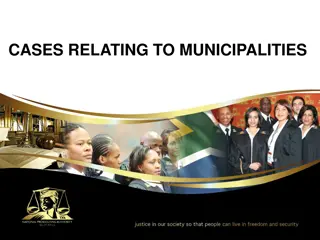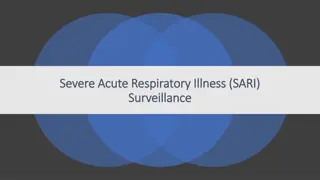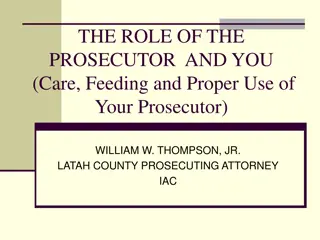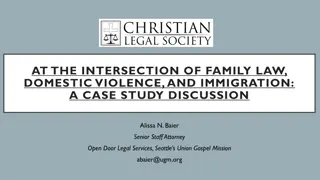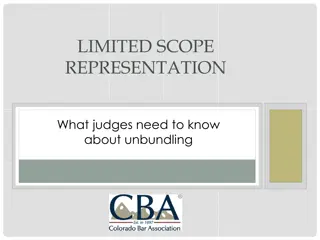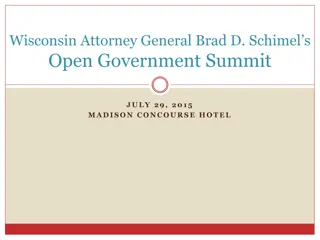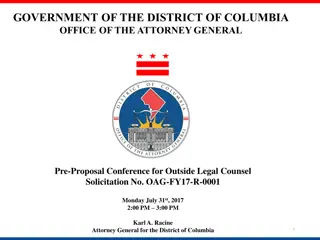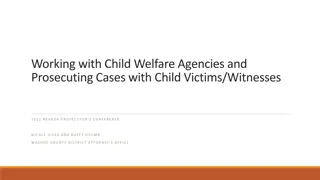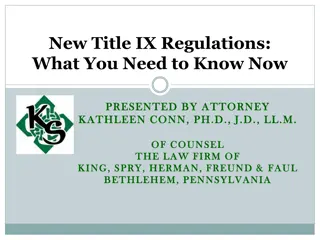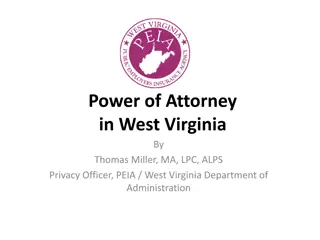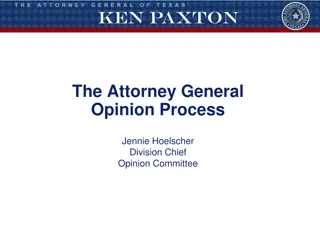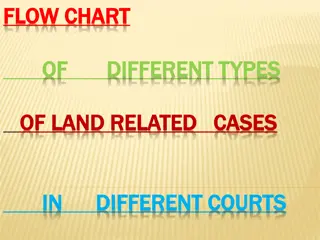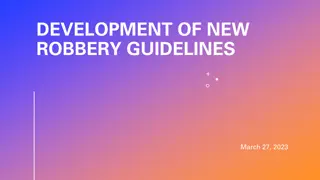Understanding the Role of a Child's Attorney in DCF Custody Cases
This training series delves into the role of a child's attorney when children are in DCF custody, covering terminology, the collaboration between caregivers and attorneys, and important procedures like emergency removal hearings and permanency decisions. Caregivers are encouraged to communicate with the attorney regarding placement and parent/child contact concerns.
Download Presentation

Please find below an Image/Link to download the presentation.
The content on the website is provided AS IS for your information and personal use only. It may not be sold, licensed, or shared on other websites without obtaining consent from the author. Download presentation by click this link. If you encounter any issues during the download, it is possible that the publisher has removed the file from their server.
E N D
Presentation Transcript
What to expect from the childs attorney Part 1 of a 2 part training series on understanding the role of the child s attorney for children in DCF custody
What the training will cover Terminology understanding the language of family regulation cases Actors professionals involved in family regulation cases Child s Attorney Role how caregivers and the attorney can work together when should caregivers expect to see the child s attorney how attorneys determine child client positions Frequently asked questions Follow up training Part 2: Client Directed Representation vs. Substituted Judgment
Terminology Committee for Public Counsel Services (CPCS) CPCS Performance Standards Substitute Caregiver Emergency Removal 72 Hour Hearing Temporary Custody Hearing Temporary Custody Order Care and Protection Trial Permanent Custody Order Adoption Trial Foster Care Review (FCR) Permanency Medical Treatment Hearings (Rogers) Attorney-Client Privilege
Actors Court Appointed Actors Child s Attorney Trial Level Child s Attorney Appeals Level Child s Attorney - Delinquency Court Investigator (CI) Court Appointed Special Advocate (CASA) Court Probation Officer Guardian ad Litem (GAL) DCF Actors Family Resource Worker Ongoing Social Worker Adoption Worker Supervisors & Managers
How caregivers and the childs attorney can work together As a substitute care giver, it is very helpful if you can reach out to the child s attorney when you have any of the following concerns.
Placement Concerns DCF moves or intends to move the child from your home You are planning to move to a new address You decide to give DCF your (10) day notice The child is telling you they want to go home Do not assume that DCF has notified the child s attorney about a planned or emergency placement change. Always try to reach out to the child s attorney as soon as you become aware of the proposed change in placement.
Parent/Child Contact Concerns The child is asking for more visits or contact with their birth family The child has not had a sibling visit or is requesting additional visits There are changes increases or decreases with the parent/child visitation schedule The child is anxious before or after a visit with their birth family The child is reporting either positive or negative things about visits with their parents You want to assist in the scheduling or transportation to/from visits
School and Educational Concerns You want to change the child s school of origin because of a transportation or a logistical issue The child is struggling on a consistent basis academically, emotionally or socially The child may need special education services The child has frequent disciplinary issues or suspensions A CRA truancy petition is filed by the school because of excessive absences A CRA habitual petition is filed by the school because of disruptive behaviors
Medical/Health Concerns The child is facing major health problems or surgery The child s pediatrician wants to start the child on psychotropic (mental health) medications You have questions about the child s family medical history You need the child s medical passport and/or insurance card There have been major changes or updates to the child s diet, allergies, medications or behaviors You are interested in coordinating with the child s parents so they can attend their child s medical appointments
Concerns with DCF as custodian of the child DCF referred programs/services the child is involved in: the appropriateness of the referral given the child s needs or personality the particular provider assigned to the child does not appear to be a good match the child is not stabilizing because of long waitlists for services DCF s decision-making regarding the well-being of the child: failure to make timely service referrals to meet the child s emotional or behavioral needs level of care is not appropriate a reduction in parent/child contact has created behavioral issues that did not previously exist. lack of sibling visits has created new behavioral issues
When should caregivers expect to see the child s attorney? CPCS recently created new performance standards around child client contact. At a minimum, counsel must visit with their client every (3) months, but are also required to meet when the following events occur.
Attorneys meet child clients when: Court Events where the child s position needs to be determined Initial appointment of counsel Hearings that determine custody, placement and visitation Medical treatment hearings Permanency hearings Trials that determine who has permanent custody of the child Adoption or Guardianship Trials Court personnel interviews with the child Court Investigator & Probation Officer Police interviews with the child Child as victim or suspect in a crime Mental Health Treatment Crisis screening & psychiatric hospitalizations of the child Starting a trial of psychotropic medications Participating in individual or family therapy
Attorneys meet child clients also when: DCF related events Changes in child s placement Foster Care Reviews 51A filed on child s placement Changes in the permanency goal for the family DYS (Dept. of Youth Services) related events Child is accused of a crime and is arraigned in Juvenile Court Child is held at a DYS placement or facility Parent/Child Contact & Visitation Parent/child visits have remained the same since the removal (i.e. 1x per week for 1 hour) Parent/child visits have been decreased permanently (i.e. weekly to 1x per month) Sibling Visitation Sibling visitation is limited to 1x per month Siblings placed together are now separated
Determining the childs position what caregivers need to know Client Directed Representation vs. Substituted Judgment
Determining the childs position - starting point The child s attorney represents the child s position in all matters involving the court, DCF and other agencies. In most cases this means the child s attorney will advocate for the expressed preferences of the child while other times, the attorney will be substituting their judgment. In either case, communications between the child and their attorney, which the attorney relies upon to articulate the child s position to the court or others, are protected in the same way as they are for adults under the attorney- client privilege. This means the child s attorney is ethically obligated to keep certain information the child tells them completely private.
Childs Legal Position 2 Options Option #1: Client directed representation When a child is capable of articulating an adequately considered decision (meaning the child can weigh out the pros/cons of their stated position) then Counsel will represent the child s wishes. If the child who is capable of adequately weighing the pros/cons decides on a position that the attorney does not feel is in his/her best interest, they are still obligated to represent that position. The child may express their position verbally or demonstrate it through reasonable alternative means. Option #2: Substituted Judgment When a child is NOT capable of making an adequately considered decision, then child s counsel makes a decision based on what they think the child would decide if the child were able to choose for him/her/their self. In addition to their legal education, attorneys representing children receive extensive training in child development and conduct an independent investigation of the circumstances regarding the child, before they are able to formulate a substituted judgment.
Flow Chart of the Decision-Making Process Can child communicate his/her/their wishes to the attorney? Attorney uses Substituted Judgment IF NO IF YES Can child make an adequately considered decision about the specific issue to be decided? Will representing client s express wishes create a risk of substantial harm? Attorney MUST represent child s Express Preferences IF NO IF NO IF YES IF YES Attorney MUST represent child s Express Preferences Attorney MAY choose either Express Preferences or Substituted Judgment
Frequently asked questions Who is the child s attorney? Begin with asking the Child s DCF Social Worker or Family Resource Worker. If neither of them knows, ask their Supervisor. If they cannot provide you with the name/contact information, contact our agency. For a list of our Agency s CAFL Trial Offices throughout the state, click on this link: https://www.publiccounsel.net/dir/ How do I contact the child s attorney? If you know the attorney s name, you can search the Board of Bar Overseers website directory for their contact information. The link to that website: https://www.massbbo.org/ Can caregivers attend court sessions? Yes, pursuant to M.G.L. ch. 119, Section 29D, caregivers have a right to attend and participate at each hearing. DCF is obligated to inform you of the dates of these he
Frequently asked questions What should I do if I have concerns about the child s behavior? Communicate with the child s attorney, the DCF social worker and the child s therapist (if there is one working with the child). What should I do if I have concerns about the DCF workers involved in the case. Reach out to the child s attorney and the social worker s supervisor to communicate your concerns. What should I do if I have concerns about the child s attorney. If you have a serious complaint you would like to file, you can do so by completing the Committee for Public Counsel Services Child and Family Law Division Complaint Form. The link: https://www.publiccounsel.net/cafl/client/ If you want, you may also email CPCS directly to report your concerns. The email: caflattorney@publiccounsel.net
Frequently asked questions Should I have contact with the child s biological family? DCF can provide you information on the child s biological family if you are willing to have contact with them. The child s attorney can help you navigate these communications. At times, communication with the biological family can assist a child with continuity. Your willingness to work with a child s biological family members, if possible, often results in the child feeling supported and accepted. If parents and substitute care givers are able to communicate and get to know each other, the child often can let go of the feeling of being in the middle or having to choose between two families. Positive interactions between the people who care for the child result in very positive outcomes. You can do this while still maintaining boundaries, by using Google Voice instead of your own phone number or beginning communications through email.
Coming Next: Part 2 of the Caregiver training series on the role of child s attorney An in depth discussion of the difference between client directed representation and substituted judgment
